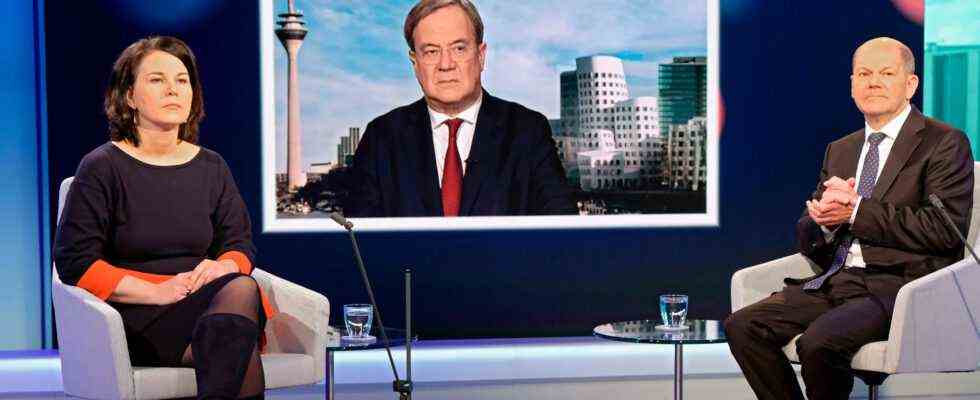analysis
Status: 08/10/2021 1:48 p.m.
Most parties have promised fair competition, but so far personal accusations have dominated the election campaign. A battle of slogans is raging online to harm political opponents.
Laschet lies, Baerbock lies, Scholz lies, Laschet’s wave, Green prevent, Baerbock Gate, Laschet laughs, Merz lies – these are just a few of the hashtags that have determined political debates on social media in recent weeks.
On Twitter, Facebook and Instagram, a micro-cosmos of politicians, their supporters, publicists and various multipliers is constantly exchanging blows about the authority to interpret current issues and events in the election campaign.
SPD video causes controversy
The parties are fueling this confrontational form of conflict: The SPD published a video that does not list its own demands, but aims to attack the Union. The Social Democrats are targeting ex-constitutional protection chief Hans-Georg-Maaßen, who repeatedly tries to draw nationwide attention to his struggle for a direct mandate for the CDU in southern Thuringia through grotesque contributions.
The head of the State Chancellery in North Rhine-Westphalia, Nathanael Liminski, is also shown in the video. It is said that whoever chooses Laschet, choose arch-Catholic confidante, for whom sex before marriage is taboo. This alludes to a statement made by Liminski in 2007 ARD-Broadcast Maischberger justified as a “personal choice”. On the show he also spoke out “against any type of artificial contraception”. The current head of the Düsseldorf State Chancellery was still a student at the time.
In 2009 – twelve years ago – several articles by Liminski were published on the platform “The Free World”, which is published by Beatrix von Storch’s husband. the WDR journalist Jochen Trum wrote about the various allegations that it was “a long time ago and is hardly suitable for assessing the current head of the State Chancellery. There are no recent statements that would result in an extremely conservative view of the world”.
Merz relies on migration policy
Friedrich Merz likes to throw himself into the fray for the Union, he accuses the Greens in a short “Focus” guest contribution of wanting to invite as many immigrants as possible to Germany – regardless of their “ability to integrate”. What exactly this is supposed to mean remains unclear. Merz spread his allegations again on Twitter in order to increase the reach.
Greens and their supporters, but also journalists and analysts, rejected Merz’s statements as a lie. The hashtag Merzlügen is making the rounds. And of course the Greens have no plans to invite as many migrants to Germany as possible. That in the party’s election manifesto However, it is actually emphasized several times that migration is to be facilitated and promoted – that is hardly an issue.
Merz’s statement is polemical and exaggerated – but it could also have been a template for the Greens to promote their own proposals on migration policy. Obviously, however, they do not see this topic as particularly suitable for the election campaign.
Attacks on Baerbock
An election campaign that has long been fought hard: Immediately after the announcement of her candidacy, Annalena Baerbock was massively attacked, sexistically attacked on social media and covered with conspiracy legends. It was a hoax that she was a puppet of billionaire George Soros. In Facebook groups such as “Prevent Baerbock” and on Telegram channels, graphics are distributed in a targeted manner that are intended to discredit them.
| Catchphrase | Interactions |
|---|---|
| Laschet laughs | 340,000 |
| Prevent Baerbock | 207,500 |
| Laschet is lying | 42,500 |
| Baerbock is lying | 14,500 |
| Merz is lying | 3500 (since August 8) |
But the influential lobby organization INSM also got involved in the election campaign with an advertising campaign against Baerbock – and received a lot of criticism, as several of the allegations were in part simply false.
That set the tone – and it became increasingly difficult to differentiate between objective criticism and personal attacks. So there was well-founded criticism of Baerbock and her crisis management, such as the allegations of plagiarism or the “adjustments” to her résumé. Not every criticism is a campaign. In the same way, CDU boss Laschet now has to put up with questions about his book from 2009 and admitted errors in this regard.
The only question is how relevant such allegations are. Some see completely overrated details in this; Others believe that whoever wants to become Chancellor must also expect that precisely such alleged trivialities are relevant for the assessment of a person.
Following the laws of social media
And so up to now mainly short-lived debates have determined the election campaign, personal attacks and insinuations entirely following the laws of social networks, namely emotional, superficial and shortened. The candidates have been busy for weeks avoiding mistakes and offering as little attack surface as possible.
The pianist Igor Levit summed up the lack of courage and constructive debates: “The fact that hardly anyone in this election campaign has the strength to tell a positive future story is one of the most frustrating experiences of all for me.”
A survey by the Reset Initiative also came to the conclusion that a majority would like a less aggressive election campaign.
The sociologist Harald Welzer emphasizes that election campaigns are now “highly personalized” and that individual politicians are being attacked personally “in the worst possible way”. In an interview with the EPD he warns: If the politically responsible behave like this, then it cannot be corrected by conjuring up values: there is a large discrepancy between Sunday speeches and lived practice.

